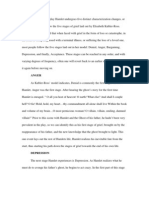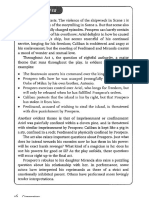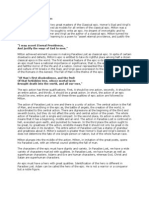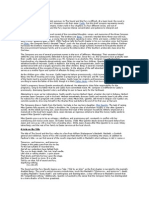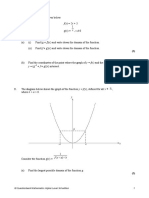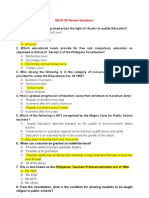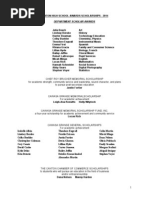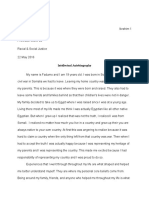Tragic Hero
Tragic Hero
Uploaded by
Pamela PapadopoulosCopyright:
Available Formats
Tragic Hero
Tragic Hero
Uploaded by
Pamela PapadopoulosOriginal Description:
Copyright
Available Formats
Share this document
Did you find this document useful?
Is this content inappropriate?
Copyright:
Available Formats
Tragic Hero
Tragic Hero
Uploaded by
Pamela PapadopoulosCopyright:
Available Formats
ARISTOTLES TRAGIC HERO
o
o
o
o
o
o
o
o
o
o
o
o
Tragedies are meant to evoke the emotions of pity and fear in the audience
Catharsis: the purging or cleansing of the emotions of pity and fear
Catharsis is that feeling of relief you feel after watching a tragedy
A tragedy has a Tragic Hero who is neither completely good nor completely
evil
A tragic hero has the potential for greatness, but is destined to fail
A tragic hero makes an error in judgement called Hamartia
A tragic hero has a tragic flaw; which is usually hubris
Hubris is overwhelming pride or self-confidence
This leads to a protagonist to disregard a divine warning or violate an
important law
Tragic heroes are responsible for their own fate
They fall from great heights and realise they have made an irreversible
mistake
They sometimes meet a tragic death and face it with honour
ARISTOTLES THEORY OF TRAGEDY (FROM POETICS)
Aristotle stipulates that the tragic hero must have four very distinct qualities
or characteristics
FOUR necessary answers to the question Who is the Tragic Hero?
First, and most important, it must be good the character must elicit
sympathy from the audience
ONE
In order for a tragedy to work, the audience must feel something for the
characters involved in it, and that can only happen if the character, under
the spotlight, is in some way good.
If the tragic hero demonstrates some character qualities that we consider to
be good, then that tragic hero can elicit that sympathy from the audience.
TWO
The second thing to aim at is propriety the character must possess
virtues that are appropriate. The virtues that that character presents must
somehow in accord with their type and position.
He might be talking about how a woman should possess virtues of nurturing
and care, where as a man might present virtues of valour and courage.
THREE
Thirdly, character must be true to life the character must be realistic.
The audience must be able to see that the character has relevance to their
real life
There must be a way in which the audience finds themselves seeing a
representation of the true world.
Aristotle continually talks about how tragedies should be representations of
true actions
FOUR
The fourth point is consistency the character must act according to a
consistent psychology. Aristotle is making a point about good writing
The audience must always realise that a tragedy is the sort of commerce
between the audience and the tragedy that unfolds on the stage.
Aristotle was concerned, not just about text, but he was concerned about the
relationship between the audience and whatever is happening on the stage.
He realised that theyd be in the same room together, that there would be
physical proximity.
ON STAGE
The tragic hero, for one reason or another specific to the tragedy itself,
commits a mistake. He commits that mistake usually because of some sort of
ignorance not necessarily because hes a bad person but because he did
not understand something Aristotles Hamartia -tragic flaw. This is the
blight on the heros character that causes the downfall.
Hamartia -tragic flaw
Aristotle emphasises very importantly, that the heros downfall must be
caused by the hero, him or herself. It cannot be caused from outside they
must have made a decision, often in ignorance, that lead to that downfall.
Perepeteia tragic irony
Tragic irony of the heros story is that he brings these problems upon himself.
Once this is in play, Aristotle identifies that the hamartia/mistake has
occurred early on in the story, perhaps before the events of the play even
open.
That mistake is made and throws into a series of events that are inevitable.
Once that mistake is made it leads to another event, another event, and
another event that cannot be stopped/avoid the disaster that is to occur.
When youre thinking about a tragedy you should think about a quality of
watching this plot that bears on inevitability.
One of the qualities of tragedy that works on the audience is the idea that
this is unstoppable, that the disaster toward which this tragic hero is aiming
cannot be stopped you know it from the beginning of the play.
TRAGIC FLAW TRAGIC IRONY + INEVITABLE SERIES OF EVENTS =
CATASTROPHE
Catastrophe a reversal of fortune (going from a high status to a low
status)
Aristotle and others have said that the hero works best when he is somehow
honoured or powerful Antigone is a princess people of high status
Reversal of fortune means that the powerful and enviable become the
powerless and pitiable. Aristotle refers to that as the catastrophe
Anagnorisis (after the catastrophe occurs)
Anagnorisis involves the tragic hero understanding what has happened
Creon understands the mistake was his and that there was nothing he could
do to solve this inevitable chain of events, and basically he is resigned to his
fate, almost an acceptance, a peace at this point, even though the peace is
extraordinarily painful and tragic.
At this point in the play, everything has ended. Everyone understands what
has been happening throughout the entire play there is a recognition and
understanding of it theres almost illumination
AUDIENCE
According to Aristotle, everything unfolding on the stage should have a
specific psychological effect on the audience. Aristotle is being an amateur
psychologist in about 400BCE and talking about a psychological reaction that
psychologists today accept as granted and sometimes use in their own
therapy
If the play has happened as it should (a tragic hero has inevitably brought
about his own destruction and has fallen from a great height), then the
audience should experience the twin emotions of pity and fear
They should pity the tragic hero (as they must like the tragic hero first
character quality = sympathy) and they are afraid because they fear that if
this can happen to the greatest of us, then what hope do we, the lowest in
the audience, have?
They experience this to such an extent that a certain psychological reaction
happens that Aristotle called catharsis.
Catharsis if you experience emotion to a certain extent sometimes youre
overwhelmed with it and it blows out your ability to feel that emotion so if
you want to purge yourself of negative emotion then sometimes feeling that
negative emotion to such an extent, will work
The audience should experience pity and fear to such an extent that they will
be so emotionally moved that they will feel better about themselves. Its
almost as if going into the theatre is psychological therapy - theyre able to
exercise and purge their negative emotion in this fictional environment and
then go back into their lives feeling better about themselves because they
have undergone some sort of therapy within the theatre = happy audience
You might also like
- Lit 5333 Module 1 AnalysisDocument11 pagesLit 5333 Module 1 Analysisapi-566305350No ratings yet
- An Analysis of Jorge Luis BorgesDocument5 pagesAn Analysis of Jorge Luis BorgesTarang Gupta100% (1)
- Death Theme in LiteratureDocument3 pagesDeath Theme in Literaturemterrano0% (1)
- Hamlet EssayDocument5 pagesHamlet Essayapi-288549511No ratings yet
- BA Thesis Oscar Wilde S Aestheticism inDocument31 pagesBA Thesis Oscar Wilde S Aestheticism inJess WilliamsNo ratings yet
- The Frogs: Euripides Sophocles Agathon HerculesDocument3 pagesThe Frogs: Euripides Sophocles Agathon HerculesSubhrajyoti RoyNo ratings yet
- Hamlet's Dramatic IronyDocument4 pagesHamlet's Dramatic IronyIsha DeshmukhNo ratings yet
- 9.1 Poetry and ProseDocument5 pages9.1 Poetry and ProseLorenzo Catalan Zamudio Jr.No ratings yet
- Brief Notes On Aristotle POETICSDocument4 pagesBrief Notes On Aristotle POETICSAbhishek M NNo ratings yet
- The MenaechmiDocument11 pagesThe MenaechmiJohn Darwin Sabio100% (1)
- PoetryessayDocument3 pagesPoetryessayapi-281802798No ratings yet
- HamletDocument5 pagesHamletsocc3rNo ratings yet
- Subvert History EssayDocument4 pagesSubvert History Essayapi-271002120No ratings yet
- Antigone - SophoclesDocument13 pagesAntigone - SophoclesellehcimNo ratings yet
- Themes Motifs in HamletDocument3 pagesThemes Motifs in HamletAnjali RayNo ratings yet
- Brodie EssaysDocument65 pagesBrodie Essaysam_mailNo ratings yet
- 09 - Chapter 3 PDFDocument40 pages09 - Chapter 3 PDFfairly jeniferNo ratings yet
- Hope Is A Thing With FeathersDocument3 pagesHope Is A Thing With FeathersGeetanjali JoshiNo ratings yet
- Throughout Act The Question of Rightful Authority, A MajorDocument14 pagesThroughout Act The Question of Rightful Authority, A Majoryingy0116No ratings yet
- Analysis of Huckle Berry FinnDocument9 pagesAnalysis of Huckle Berry FinnHannah Jusilef0% (1)
- The RoomDocument6 pagesThe RoomJovanaSimijonovićNo ratings yet
- An Essay On Man Epistle IDocument3 pagesAn Essay On Man Epistle IAnonymous SY1kBzuNo ratings yet
- Gothic Novel Definition: of The Gothic Initiated by WalpoleDocument5 pagesGothic Novel Definition: of The Gothic Initiated by Walpolesehrish noreenNo ratings yet
- Lears Daughters Scenes SummaryDocument39 pagesLears Daughters Scenes SummaryCardboard Gaming100% (1)
- Shall I Compare Thee To A Summer 1Document7 pagesShall I Compare Thee To A Summer 1api-385259844No ratings yet
- Antigone Theme EssayDocument3 pagesAntigone Theme Essaysam elizaNo ratings yet
- The Death Drive in Shakespeare's Antony and CleopatraDocument8 pagesThe Death Drive in Shakespeare's Antony and CleopatraJay KennedyNo ratings yet
- Paradise Los1Document2 pagesParadise Los1khushnood ali0% (1)
- A New GenreDocument3 pagesA New Genrerocknrameez87100% (1)
- Through The Looking GlassDocument3 pagesThrough The Looking GlassSamy PerezNo ratings yet
- ComedyDocument3 pagesComedyali purityNo ratings yet
- ComedyDocument2 pagesComedyRanvithaNo ratings yet
- 2 The Convergence of The TwainDocument7 pages2 The Convergence of The TwainRaisa Binte HudaNo ratings yet
- Hamlet EssayDocument5 pagesHamlet Essayapi-3182428720% (1)
- Love Song of J.alfred PrufrockDocument1 pageLove Song of J.alfred PrufrockDiana Popescu100% (1)
- The Tiger: William BlakeDocument19 pagesThe Tiger: William BlakeMohammad Suleiman Alzein100% (1)
- Colonial Discourse and English StudiesDocument9 pagesColonial Discourse and English StudiesDaisy rahmanNo ratings yet
- 2 DramaDocument7 pages2 DramaJohn RajkumarNo ratings yet
- Romeo and Juliet Literacy ReviewDocument2 pagesRomeo and Juliet Literacy ReviewMitchell Ryan100% (1)
- Reading Questions Act IV HAMLET-D - For Answering DigitallyDocument3 pagesReading Questions Act IV HAMLET-D - For Answering DigitallyZipporah HamiltonNo ratings yet
- The Rime of The Ancient Mariner Master AnswerDocument4 pagesThe Rime of The Ancient Mariner Master Answerjustforsalethecocacc100% (1)
- Victorian PoetryDocument2 pagesVictorian PoetryOlivera BabicNo ratings yet
- Anna Akhmatova - Author of RequiemDocument3 pagesAnna Akhmatova - Author of RequiemRahul TambiNo ratings yet
- What Is A Tragic HeroDocument3 pagesWhat Is A Tragic Herouniquecorn27100% (2)
- The Tempest - NotesDocument11 pagesThe Tempest - NotesAnthonya KnightNo ratings yet
- Tempest SummaryDocument1 pageTempest SummaryJo March100% (3)
- Edmund Spenser Faerie QueenDocument6 pagesEdmund Spenser Faerie QueensumiNo ratings yet
- Short Biography of ShakespeareDocument3 pagesShort Biography of ShakespeareSr Chandrodaya JNo ratings yet
- Tragic Hero, Classiscal Trajedy, Trajic FlawDocument9 pagesTragic Hero, Classiscal Trajedy, Trajic FlawAreej GhaffarNo ratings yet
- The Spanish TragedyDocument24 pagesThe Spanish Tragedyshilpa rayNo ratings yet
- The Tempest: As A Post-Colonial PlayDocument16 pagesThe Tempest: As A Post-Colonial PlayShah Raj100% (1)
- Analysis of Poem Love Song...Document8 pagesAnalysis of Poem Love Song...LinaNo ratings yet
- The Sound and The FuryDocument21 pagesThe Sound and The FuryFátima AbbateNo ratings yet
- Hamlet Scene SummaryDocument20 pagesHamlet Scene SummaryMarcus Turver100% (1)
- Character in If On A Winter's Night A TravelerDocument6 pagesCharacter in If On A Winter's Night A Travelerdanilo lopez-roman0% (1)
- The Tragedy of HamletDocument7 pagesThe Tragedy of HamletAriel Dela CruzNo ratings yet
- The Elements of PoetryDocument8 pagesThe Elements of PoetryRubab ChaudharyNo ratings yet
- "Paradise Lost" Book-I: A Critical AppreciationDocument6 pages"Paradise Lost" Book-I: A Critical AppreciationthisisghostactualNo ratings yet
- Naturalism and RealismDocument3 pagesNaturalism and Realismanglophile50No ratings yet
- MathHL QB3 T2Document25 pagesMathHL QB3 T2Nikola PetrovicNo ratings yet
- Hummingbird Wizard-Myth Busting The Conquest of Mexico: Duncan StoneDocument1 pageHummingbird Wizard-Myth Busting The Conquest of Mexico: Duncan StonedcNo ratings yet
- Medical Emergencies Management GuidelinesDocument100 pagesMedical Emergencies Management GuidelinesMohamad khairil anwarNo ratings yet
- NSI Near Far PDFDocument12 pagesNSI Near Far PDFrajasekarkprNo ratings yet
- Pakistan's Intelligence Agencies - The Inside Story - From The Archives - HeraldDocument7 pagesPakistan's Intelligence Agencies - The Inside Story - From The Archives - HeraldIftikhar AhmadNo ratings yet
- 138 - 1974 - Muslim LawDocument13 pages138 - 1974 - Muslim LawAditya MaheshwariNo ratings yet
- Za HL 1012 South Africa at The Summer Olympics Comprehension Part 2 Swimming - Ver - 1Document9 pagesZa HL 1012 South Africa at The Summer Olympics Comprehension Part 2 Swimming - Ver - 1makaylaNo ratings yet
- OPS - Crew Development Program Introduction, Revised Dec2010Document5 pagesOPS - Crew Development Program Introduction, Revised Dec2010tkdjohn1No ratings yet
- Chapter 9 Efficient Market HypothesisDocument21 pagesChapter 9 Efficient Market HypothesisAanchalNo ratings yet
- EDUC 55 Review Questions: 6. When Can A Teacher Be Granted An Indefinite Leave?Document21 pagesEDUC 55 Review Questions: 6. When Can A Teacher Be Granted An Indefinite Leave?China May SabanganNo ratings yet
- (M3-MAIN) Mediums and Styles in ArtDocument70 pages(M3-MAIN) Mediums and Styles in ArtKhristian SorianoNo ratings yet
- Program AwardsDocument4 pagesProgram AwardsCantonCompassNo ratings yet
- XII Determinants AssignmentDocument2 pagesXII Determinants AssignmentCRPF SchoolNo ratings yet
- The Only Victims of War Are The Poor or InnocentsDocument15 pagesThe Only Victims of War Are The Poor or InnocentsJuanNo ratings yet
- Chem Expo 12Document41 pagesChem Expo 12Anonymous na314kKjOA100% (1)
- Battery Support System 2 InstructionsDocument28 pagesBattery Support System 2 InstructionsLucila Figueroa GalloNo ratings yet
- ZDC - LMC PresentationDocument54 pagesZDC - LMC PresentationS M Jagadish JagadishNo ratings yet
- MSC Slides (Day 1) 2022Document33 pagesMSC Slides (Day 1) 2022torpleNo ratings yet
- Regionalsim Vs Multilateralism: Regional Trade AgreementsDocument16 pagesRegionalsim Vs Multilateralism: Regional Trade AgreementsHemantPrajapatiNo ratings yet
- Describing Events GRASPS Unit 4: Applications of ProbabilityDocument5 pagesDescribing Events GRASPS Unit 4: Applications of Probabilitybobburns215No ratings yet
- GC Geria Tool-Module1Document12 pagesGC Geria Tool-Module1Patricia Mae MirandaNo ratings yet
- Reflaction 3Document8 pagesReflaction 3api-311351135No ratings yet
- Thomas Quirke CVDocument3 pagesThomas Quirke CVapi-545610225No ratings yet
- NDEP Narrative ReportDocument1 pageNDEP Narrative ReportKRISTALYN MARY DIWAYAN100% (2)
- Forecast Quý 1 Năm 2024Document78 pagesForecast Quý 1 Năm 2024diemngocxuanhoa2006No ratings yet
- Unit-2 Indian Scriptures PDFDocument15 pagesUnit-2 Indian Scriptures PDFSurendra Pratap Singh100% (1)
- Bristlecon E: AboutDocument12 pagesBristlecon E: AboutDiksha KamraNo ratings yet
- MMW - Correlation AnalysisDocument5 pagesMMW - Correlation AnalysisAliana CorralNo ratings yet
- Desvenlafaxine Venlafaxine: StructureDocument6 pagesDesvenlafaxine Venlafaxine: StructureAndrew PanickerNo ratings yet












